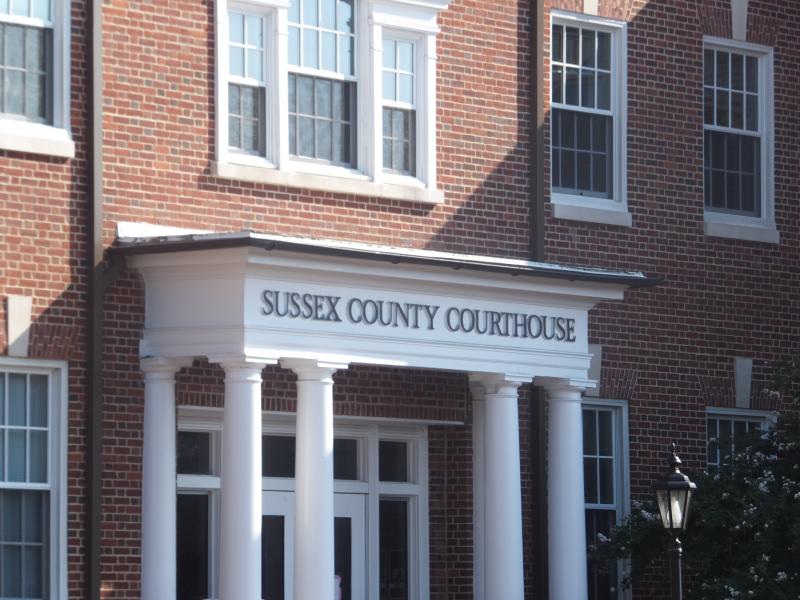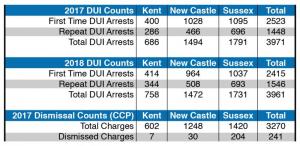Sussex establishes DUI case review process

Delaware Superior Court in Sussex County is the last of the state’s three counties to establish a case-review process for misdemeanor DUIs. Still, the manner in which the Department of Justice has proceeded has rankled members of the defense bar, who say their clients were caught up in a political struggle.
Department of Justice spokesman Carl Kanefsky said DUI arrests are disproportionately and unacceptably high in Sussex County, while the other two counties have cut their DUIs by more than half over the last decade.
David Hume, head of the Sussex County Attorney General’s Office, said DUI cases start with an arrest and then typically move forward to arraignment in Court of Common Pleas. There, the defendant can either accept a plea or decide to go to trial. In New Castle and Kent counties, the Court of Common Pleas has case review; this allows defense counsel to conduct discovery, which means attorneys have a chance to review evidence in the case, Hume said. However, Sussex has case review only at the Superior Court level.
Both Kent and New Castle counties also have DUI Court, a diversionary court similar to Drug Court or Veterans Court, mostly for second offense DUIs. Hume says this court allows second-offense DUIs to enter an inpatient treatment program instead of taking a mandatory 60-day jail sentence for second-offense DUI.
“In Sussex, if you have a DUI second, you go to jail and you don’t get that treatment. We have people in Sussex going to jail where people in the other two counties are getting treatment. That doesn’t make sense to us. We want to try to rehabilitate people so they do not commit these offenses again, potentially harming somebody or harming themselves,” Hume said.
According to the department’s statistics, in Sussex County in 2017, there were 1,095 first-time, misdemeanor DUI arrests and 695 second arrests. In 2018, the numbers were similar, 1,037 first-time arrests and 693 repeat arrests. New Castle County, which has more than double the population of Sussex, had 1,028 first-time arrests and 466 repeat arrests in 2017, and 964 first-time arrests and 508 repeat arrests in 2018.
In 2017, according to the department’s statistics, there were 1,420 DUI cases charged in the Court of Common Pleas in Sussex County. Of those, 204 were dismissed in part because in Court of Common Pleas there is no discovery.
He said the Attorney General’s Office has been asking the Court of Common Pleas for a case-review process for years and has not gotten anywhere.
The Attorney General’s Office gave the court a Sept. 23 deadline to implement the changes it sought or the office would begin dropping misdemeanor DUI cases in Court of Common Pleas and indicting the accused in Superior Court. According to court documents, the judges balked at the demands, saying the court did not have the resources for what the Attorney General’s Office was demanding.
So, after the deadline came and went, the Attorney General’s Office implemented the change and began indicting defendants, putting out warrants for their arrests.
Defense attorneys fight change
Moving misdemeanor DUI cases to Superior Court drew ire from defense attorneys, who filed motions to dismiss the charges or move the cases back to Court of Common Pleas.
Two of those attorneys, Eric Mooney and Ronald Phillips, had 28 of their motions heard by Judge Richard F. Stokes Oct. 18. Of the 28 motions, which Stokes heard as a group, 24 were brought by Mooney and four by Phillips. Mooney’s and Phillips’ clients were sent letters telling them of the change of venue in their cases, but Mooney said the letters were not uniform, and some defendants had no idea when they would be charged, or where and when they’d have to show up for court.
While the Attorney General’s Office has authority to try cases in whatever court it chooses, Mooney and Phillips argue that the state is manipulating the system and abusing the process at the expense of their clients. One of Mooney’s clients, according to court documents, was rousted out of bed at 5 a.m. by Delaware State Police. He was arrested, but he had no idea there was a warrant out for his arrest until the police showed up at his home.
“They’re just manipulating the court and abusing the process at the expense of these people. It’s wrong. I understand they’re accused of a crime, but when you get jerked out of your house at 5 a.m., arrested and taken to the court? I don’t think that’s appropriate,” Mooney said. “What’s happening here is the whole backdrop to this is the Department of Justice is not able to force the Court of Common Pleas to do things in Sussex the way they want them to do it.”
Mooney said he thinks the Department of Justice wants to change the system in order to make things easier for prosecutors. Phillips elaborated, saying by adding case reviews, prosecutors have additional opportunities to adjust their cases prior to trial. Mooney said, in his opinion, case reviews will have little bearing on whether a prior DUI offender drinks and drives again.
Attorney General Kathy Jennings noted the rate of dismissals is much higher in Sussex County than in the other counties, but second DUI arrests are also higher.
“It doesn’t make sense to me to have the status quo. There are people out there desperately in need of help. To have a DUI Court in Kent and New Castle County – it’s working. It’s really working,” Jennings said.
She said the Attorney General’s Office has no control over the judiciary’s budget, but the office would be supportive if the judges were to ask for the resources for a DUI Court.
“We have offered to help them in the budget process. If they were to ask for an additional judge or they were to ask for more resources in Sussex County to do a DUI Court, we would go to bat for them because these statistics are dramatic. It is a huge public safety issue,” Jennings said.
She said she does not see the DUI arrest totals in Sussex County going down without DUI Court.
As for indicting first-offense DUI offenders in Superior Court, Jennings said the Attorney General’s Office had no choice.
“The only court where we are going to get a case review is Superior Court. We don’t want to do this, but at least in that situation, the person accused gets an extra court hearing to work things out,” she said.
Hume said all indictments are handled through a 10-person grand jury, which meets every two weeks. Jennings said while she does not like going this route, Superior Court agreed to accept the cases. Hume added that the grand jury can work through all the indictments in a single day.
“We worked hard to make sure this is an efficient process,” he said.
During the Oct. 18 hearing, Stokes questioned Mooney as to why the state couldn’t file misdemeanor DUI charges in Sussex County. If there is no uniformity at the Court of Common Pleas level, he asked, why can’t they file in Superior Court where there is a uniform process? Stokes said even with the cases going to Superior Court, the defendants still have the opportunity to have their case heard.
“How is that a problem?” Stokes asked. “It’s hard to see how that’s prejudicial.”
Stokes said, “It’s a true disappointment that there is not a consistent process. There should be a consistent process for cases to be managed efficiently.”
Mooney and Phillips say they think about 100 defendants have been indicted in Superior Court. Should Stokes rule against them, Mooney said the cases will play out in Superior Court with multiple case reviews before a trial. Stokes did not give a timetable for when he would issue a ruling.








































